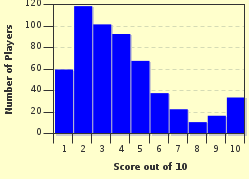Quiz Answer Key and Fun Facts
1. What was the Roman pretext for intefering in Africa?
2. When Rome had declared war the Carthaginians sent a delegation to Rome to ask for peace. What was the Roman response?
3. One Roman senator had served against the Carthaginians in Spain during the Second Punic War and had developed a deep loathing for them. He finished every speach he made in the house with the words "Delenda est Carthago!" Carthage must be destroyed! What was his name?
4. Who was chosen to command the Carthaginian army in the campaign?
5. Which of the following is one of the main sources for information on the 3rd Punic War?
6. The Romans quickly laid siege to Carthage. How long did the siege last?
7. When the Romans laid siege to the city, they blocked the mouth of the harbour, preventing supplies and troops reaching Carthage. How did the Carthaginians attempt to counter this?
8. When the Romans finally broke into the city they massacred its inhabitants. The survivors were trapped in the citadel and forced to surrender, they were all sold into slavery. What was the fate of the commander of the city?
9. According to Polybius, what was the reaction of the Roman commander, Scipio Amelianus, to the fall of the city?
10. Which other ancient city did the Romans destroy in 146BC?
Source: Author
bobalmighty
This quiz was reviewed by FunTrivia editor
bloomsby before going online.
Any errors found in FunTrivia content are routinely corrected through our feedback system.

